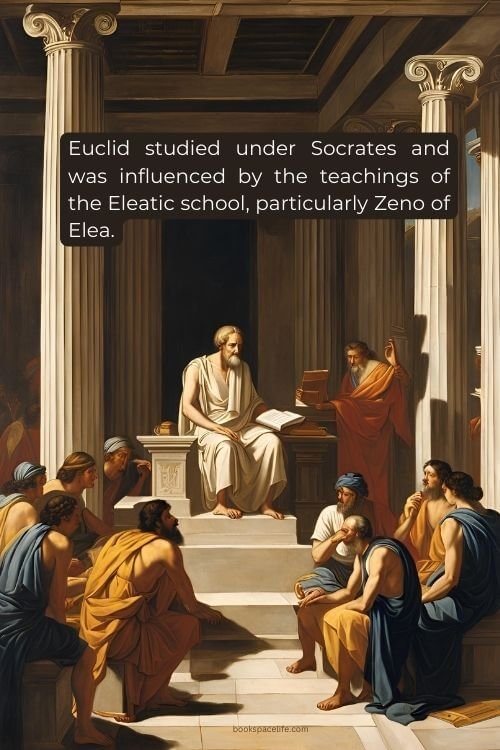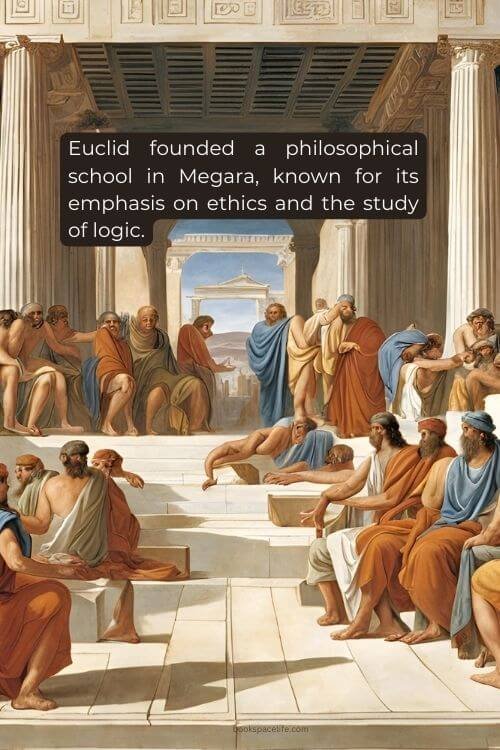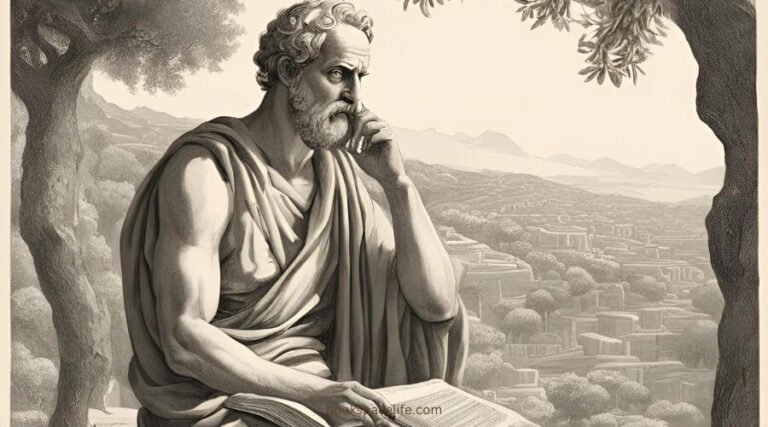Thales of Miletus
Euclid of Alexandria: The Father of Geometry
Euclid of Alexandria, known as the “Father of Geometry,” was a Greek mathematician whose work formed the foundation of modern mathematics.
His seminal work, the Elements, is one of the most influential mathematical texts in history and was used as the primary textbook for teaching mathematics for over 2,000 years.
Euclid’s contributions extend beyond geometry; he played a key role in shaping logical reasoning and mathematical rigor, principles that have influenced mathematics, science, and philosophy throughout the centuries.
Despite the monumental impact of Euclid’s work, details about his life remain elusive. Much of what we know comes from later sources, which provide only limited information.
Nevertheless, Euclid’s legacy as a mathematician, educator, and philosopher is firmly established in history.
Quick Read
Table of Contents
(1) Birth and Early Life
The exact details of Euclid’s birth, including his birth year and birthplace, remain uncertain.
It is widely accepted that he was born around 300 BCE, though some sources suggest he could have been born as early as 325 BCE.
While his birthplace is often assumed to be Alexandria, there is a possibility that he was originally from Athens or another prominent Greek city and later moved to Alexandria, which had become a vibrant center of knowledge and learning under the rule of the Ptolemaic dynasty.
At the time, Alexandria was home to the Library of Alexandria, an institution that attracted scholars from across the Mediterranean and was a major hub of intellectual activity.
If Euclid did indeed live in Alexandria, he would have been part of one of the most illustrious learning environments in the ancient world, which included scholars from various fields such as mathematics, astronomy, medicine, and philosophy.

(2) Education and Influences
Though there are few records of Euclid’s early education, it is likely that he studied in Athens, where he may have been influenced by Plato’s Academy.
Greek educational traditions of the time emphasized rigorous training in geometry, logic, and philosophy.
Many historians believe that Euclid studied the works of Plato and Aristotle, as well as earlier mathematicians such as Pythagoras and Eudoxus of Cnidus.
His work also shows the influence of Hippocrates of Chios, a mathematician who had earlier attempted to organize geometric knowledge systematically.
The style and organization of Euclid’s work suggest a deep familiarity with Platonic philosophy, which valued ideal forms and precise definitions.
Plato emphasized the importance of geometry as a means to understand the true nature of reality, and Euclid’s geometric work reflected this Platonic ideal.
In this way, Euclid’s approach to mathematics was not only practical but also philosophical, reflecting the Greek belief that mathematics provided insight into the fundamental nature of the universe.
(3) The Establishment of Euclid’s School in Alexandria
Upon arriving in Alexandria, Euclid is believed to have established a mathematical school. This school quickly became one of the most respected centers of mathematical learning in the ancient world.
Euclid’s students were trained in geometry, arithmetic, and logical reasoning, preparing them to engage with the advanced topics of the time.
Euclid’s approach to teaching mathematics focused on rigorous proof, systematic methodology, and clarity of exposition.
Euclid’s role as an educator helped disseminate his ideas and laid the foundation for the continued development of mathematical thought.
His school attracted students from across the Hellenistic world, and the reputation of his teachings spread widely, reaching as far as the Roman Empire and beyond.
Euclid’s school also made Alexandria the center of mathematical thought for centuries, influencing scholars well into the Middle Ages.

(4) The Elements: Euclid’s Magnum Opus
Euclid’s most famous work, The Elements, is a comprehensive compilation of the mathematical knowledge of his time, organized into thirteen books. This text covers topics such as geometry, number theory, and irrational numbers, and it systematically builds on a foundation of basic principles and definitions.
Euclid’s logical structure in The Elements set a new standard for mathematical rigor, presenting definitions, axioms, theorems, and proofs in a carefully organized manner.
- Structure and Axioms: Euclid began The Elements with a series of definitions, postulates, and common notions (axioms). From these foundational statements, he logically deduced the properties of geometric figures, number theory, and proportions. One of the most famous postulates is the parallel postulate, which states that through a point not on a given line, there exists exactly one line parallel to the given line. This postulate later became the subject of extensive study and ultimately led to the development of non-Euclidean geometry.
- Theorems and Proofs: The Elements contains over 465 propositions, each proven in a logical, step-by-step manner. This rigorous structure was groundbreaking, setting a standard for the presentation of mathematical proofs. Many of the propositions in The Elements, such as the Pythagorean theorem, were not new; however, Euclid’s systematic approach provided a clear framework that was accessible and replicable, allowing future generations to learn and expand on these ideas.
- Number Theory: In addition to geometry, The Elements includes work on number theory. Euclid addressed concepts like prime numbers, the greatest common divisor (GCD), and perfect numbers. His algorithm for finding the GCD, known today as the Euclidean algorithm, remains fundamental to modern mathematics.
(5) Euclid’s Philosophy of Mathematics
Euclid’s approach to mathematics reflected a philosophical belief in the existence of absolute truths that could be discovered through logical deduction.
He saw geometry as a path to understanding the eternal and unchanging truths about the world.
His method of using axioms and deriving propositions from them demonstrated a belief in the power of reason and logic to uncover these truths.
Euclid’s influence on logical reasoning extended beyond mathematics. His approach became a model for deductive reasoning, which was later applied in philosophy, science, and law.
Euclid demonstrated that by starting from a few basic principles, one could derive an entire body of knowledge.
This concept became a cornerstone of Western thought, influencing philosophers and scientists, including René Descartes and Isaac Newton.
(6) Influence and Impact
- Long-Lasting Educational Tool: The Elements was the primary textbook for teaching mathematics in the Western world for over two millennia. Its influence spread from Greece to the Islamic world, where scholars translated it into Arabic and preserved its teachings during the Middle Ages. The Islamic scholars in cities like Baghdad and Cordoba continued to study and expand on Euclid’s work, ensuring its survival and eventual reintroduction to Europe during the Renaissance.
- Renaissance and Enlightenment Influence: When The Elements was reintroduced to Europe in the 12th century, it became a cornerstone of the Renaissance and Enlightenment educational curricula. Philosophers and scientists of the time, such as Galileo Galilei, Johannes Kepler, and Isaac Newton, studied Euclid’s work and were influenced by his method of systematic reasoning and proof.
- Foundations of Geometry: Euclid’s treatment of geometry established a standard that lasted until the 19th century. His parallel postulate became a central question in the study of geometry, ultimately leading to the discovery of non-Euclidean geometries by mathematicians like Nikolai Lobachevsky and Carl Friedrich Gauss. This development showed that alternate forms of geometry could exist, but Euclidean geometry remains essential for practical applications such as engineering and architecture.
- Influence on Logical Systems and Formalism: Euclid’s approach in The Elements laid the groundwork for modern formalism in mathematics, which relies on a system of axioms and theorems to build mathematical systems. His work influenced David Hilbert, who in the 20th century formalized the foundations of Euclidean geometry in Hilbert’s axioms, providing a more rigorous logical framework for geometry that is still studied today.
- Inspiration Across Disciplines: Euclid’s logical rigor and method of systematic proof inspired advancements not only in mathematics but also in fields like philosophy and law. The deductive method Euclid employed served as a model for scientific inquiry, as his reliance on axioms and derived truths paralleled the scientific method’s reliance on hypotheses and empirical testing.
(7) Euclid’s Legacy
Euclid’s work set a precedent for mathematical rigor that remains foundational. The success of The Elements as an educational text and as a mathematical treatise demonstrates the timeless nature of Euclid’s approach.
His method of building complex ideas from simple, agreed-upon principles serves as a guide for logical thought in fields ranging from computer science to artificial intelligence.
In addition to his influence on mathematics, Euclid’s method laid the groundwork for disciplines that rely on formal logic and deductive reasoning.
The approach he pioneered inspired subsequent generations of mathematicians, scientists, and philosophers, who built upon his ideas to explore and understand the world.
(8) Conclusion: The Enduring Influence of Euclid
Euclid of Alexandria remains one of the most influential figures in the history of mathematics and philosophy.
His approach to geometry, based on logical reasoning and systematic proof, set a standard for intellectual rigor that has endured through the centuries.
His influence can be seen in the educational systems, scientific methodologies, and mathematical advancements that define modern intellectual thought.
Though much about Euclid’s life remains a mystery, his work has transcended time, culture, and language, establishing him as a foundational figure in Western knowledge.
Euclid’s legacy lives on in the continued study of geometry and in the principles of logical thought and deductive reasoning that he helped pioneer. Through
(A) 7 Quick Facts on Euclid of Alexandria
- Date of Birth: Euclid of Megara was born around 450 BCE, during a time of significant philosophical development in ancient Greece.
- Place of Birth: He was born in Megara, an ancient Greek city located near modern-day Megara, Greece.
- Education: Euclid studied under Socrates and was influenced by the teachings of the Eleatic school, particularly Zeno of Elea.
- Travel to Athens: He traveled to Athens, where he became involved in philosophical discussions and furthered his education and understanding of dialectics.
- Philosophical Contributions: Euclid is known for his dialectical method, which emphasizes logical reasoning and debate, focusing on definitions and premises.
- Founding a School: He founded a philosophical school in Megara, known for its emphasis on ethics and the study of logic.
- Legacy: Euclid’s work laid the groundwork for future philosophers and contributed to the development of logic and dialectics in ancient philosophy.
(B) 10 Quotes attributed to Euclid of Alexandria
- The essence of a thing is what is important.
- It is not the voice that commands the story; it is the story that commands the voice.
- A wise person does not argue for the sake of winning.
- To learn is to change one’s mind.
- The pursuit of knowledge is the pursuit of wisdom.
- An argument must be founded on solid premises.
- The good is what all things strive for.
- He who knows, does not speak; he who speaks, does not know.
- Real knowledge consists in knowing the limits of one’s understanding.
- Every definition should reveal the essence of the thing defined.







